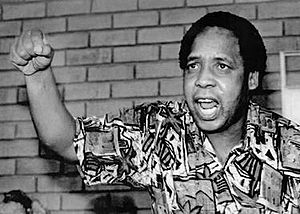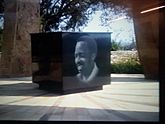Chris Hani facts for kids
Quick facts for kids
Chris Hani
|
|
|---|---|

Chris Hani
|
|
| 11th General Secretary of the South African Communist Party | |
| In office 1991–1993 |
|
| Preceded by | Joe Slovo |
| Succeeded by | Charles Nqakula |
| Chief of Staff of Umkhonto we Sizwe | |
| In office 1987–1992 |
|
| President | Oliver Tambo |
| Preceded by | Joe Slovo Keith Mokoape (acting) |
| Succeeded by | Siphiwe Nyanda |
| Personal details | |
| Born |
Martin Thembisile Hani
28 June 1942 Cofimvaba, Transkei, Union of South Africa (now Cofimvaba, Eastern Cape, South Africa) |
| Died | 10 April 1993 (aged 50) Dawn Park, Boksburg, Gauteng, South Africa |
| Cause of death | Assassination |
| Political party | South African Communist Party |
| Other political affiliations |
African National Congress (Tripartite Alliance) |
| Spouses | Limpho Hani (until 1993; his death) |
| Children | 3 |
| Occupation |
|
| Military service | |
| Allegiance | Umkhonto We Sizwe |
| Branch/service | Soviet Union (1963) Zambia (1967) |
| Years of service | 1962-1992 |
| Rank | Commander Political commissar (1967) |
| Unit | Zimbabwe People's Revolutionary Army South African National Defence Force |
| Battles/wars | Rhodesian Bush War |
Chris Hani (born Martin Thembisile Hani, 28 June 1942 – 10 April 1993) was a brave South African leader. He fought against apartheid, which was a system of unfair racial separation. Chris Hani was a key figure in the African National Congress (ANC) and the South African Communist Party. He was sadly killed in 1993, just before South Africa became a full democracy.
Contents
Who Was Chris Hani?
His Early Life and Education
Chris Hani was born on 28 June 1942 in a village called Cofimvaba in Transkei. He was one of six children. He was a very bright student and finished two school grades in a single year, twice!
When he was 12, Chris learned about apartheid from his father. He wanted to join the African National Congress (ANC) to fight against it. At 15, while at Lovedale school, he secretly joined the ANC Youth League. This was brave because political groups were not allowed in black schools. He even encouraged other students to join.
In 1959, Chris went to the University of Fort Hare. He studied English, Latin, and literature. He focused on his studies and fighting for justice, saying, "I would rather fight apartheid than play sport."
Joining the Fight Against Apartheid
Chris Hani became a strong activist from a young age.
- He joined the ANC Youth League at 15.
- As a student, he protested against unfair education laws.
- After university, he joined Umkhonto we Sizwe (MK), the armed part of the ANC.
- He was arrested for his activism and had to leave South Africa in 1963.
- He changed his first name to Chris to stay hidden from the government.
Military Training and Leadership
Chris Hani received military training in the Soviet Union. He fought in the Zimbabwean War of Liberation, also known as the Rhodesian Bush War. These were joint operations with MK and the Zimbabwe People's Revolutionary Army. His bravery in these battles made him a respected soldier.
He became known for his strong leadership and earned the loyalty of many fighters. He later became the Deputy Commander of MK. In 1982, he was a target for assassination attempts, so he moved to the ANC's main office in Lusaka, Zambia. He was known for protecting the rights of women in military camps.
In 1990, the ANC was allowed to operate openly in South Africa again. Chris Hani returned and became the head of the South African Communist Party in 1991. He supported ending the armed struggle and working towards peace through negotiations.
His Assassination and Its Impact
A Tragic Day
Chris Hani was killed on 10 April 1993, outside his home in Dawn Park. A man named Janusz Waluś shot him. A brave housewife, Margareta Harmse, saw Waluś and called the police. Another neighbor also saw the crime and helped identify the killer.
Clive Derby-Lewis, a politician from the Conservative Party, was also arrested. He had lent Waluś the gun. The Conservative Party was against ending apartheid.
A Turning Point for South Africa
Chris Hani's death caused great sadness and anger across South Africa. Many people feared that the country would erupt in violence. However, this tragic event pushed leaders on both sides to act quickly. They agreed that the first democratic elections would happen on 27 April 1994. This was just over a year after Hani's death. His assassination became a turning point, speeding up the move to a peaceful democracy.
Justice for His Killers
In October 1993, Janusz Waluś and Clive Derby-Lewis were found guilty of murder. They were sentenced to life in prison after the death penalty was removed in South Africa.
They later asked for amnesty from the Truth and Reconciliation Commission. They claimed they killed Hani for political reasons. However, their request was denied because the Commission found they did not act under orders from a political party. Clive Derby-Lewis was released for health reasons in 2015 and died a year later. Janusz Waluś remained in prison for many years and was eventually granted parole in December 2022.
Chris Hani's Lasting Influence
Chris Hani was a very popular and inspiring leader. Many young people who fought against apartheid looked up to him. At the time of his death, he was one of the most loved ANC leaders, second only to Nelson Mandela. His support for peaceful talks with the apartheid government was very important. It helped keep activists calm and focused on building a new, fair South Africa.
Honours and Memorials
Chris Hani has been honored in many ways:
- In 1997, the huge Baragwanath Hospital was renamed the Chris Hani Baragwanath Hospital in his memory.
- In 2004, he was voted 20th in the "Greatest South Africans" poll.
- A District Municipality in the Eastern Cape is named the Chris Hani District Municipality.
- The Thembisile Hani Local Municipality in Mpumalanga also carries his name.
- A new train station in Khayelitsha, Cape Town, was named Chris Hani in 2009.
- He received several medals posthumously (after his death) for his service:
See also
 In Spanish: Chris Hani para niños
In Spanish: Chris Hani para niños
 | Roy Wilkins |
 | John Lewis |
 | Linda Carol Brown |


